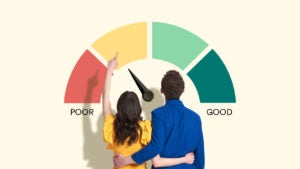Does filing for unemployment hurt your credit score?




Losing your job is stressful, and it’s natural to worry about how it might affect your finances – including your credit. The good news is that filing for unemployment benefits won’t directly affect your credit score.
However, the financial strain that often accompanies unemployment can indirectly affect your credit. Understanding these challenges and how to manage them can help you protect your financial health during this time.
The relationship between unemployment and credit
Unemployment benefits are not reported to credit bureaus and are not considered when calculating your credit score. Credit scoring models, such as FICO and VantageScore, are designed to evaluate your financial behavior. They do not include details about your salary, current employment or unemployment benefits.
Instead, your credit report reflects how you manage debt, such as your history of making on-time payments, your credit utilization ratio and your mix of credit accounts. This means that applying for or receiving unemployment won’t appear on your credit report or affect your score.
However, your employment status could influence some situations, such as applying for new credit. Lenders may ask about your income or employment to assess your ability to repay a loan. In this case, being unemployed may affect a lender’s decision-making process.
Indirect ways unemployment can impact your credit
While filing for unemployment doesn’t directly affect your credit, having less income can create ripple effects that influence your credit score.
Missed payments due to reduced income
Falling behind on payments is one of the most significant risks to your credit during unemployment. While unemployment benefits offer some income, the reduction can make it harder to cover all your bills on time.
Unfortunately, even one missed payment can negatively impact your credit score. Payment history accounts for 35 percent of your FICO score, making it the most important factor in credit calculations.
When income is limited, it’s easy for bills to pile up, especially for fixed expenses like rent, utilities and loan payments. Your score can drop quickly if missed payments are reported to the credit bureaus. Unpaid bills may also end up in collections, further damaging your credit.
To avoid these outcomes, make at least the minimum payments on all your accounts. Prioritize mandatory expenses and look for ways to lower or eliminate other bills. If necessary, consider exploring options for financial relief, such as hardship programs offered by creditors.
Increased credit card utilization
When your income drops, you may need to rely more on credit cards to cover everyday expenses. While this can be a temporary solution, it can also raise your credit utilization ratio (the percentage of your available credit that you’re using). Since credit utilization makes up 30 percent of your FICO score, carrying high balances can lead to a noticeable drop.
For example, if you have a credit limit of $10,000 and your balance climbs to $6,000, your utilization ratio is 60 percent, well above the recommended threshold of 30 percent. Lenders may view this as a sign of financial strain. This could affect your ability to qualify for credit in the future.
Potential reduction of available credit
Lenders and credit card issuers sometimes monitor your account for changes in spending patterns. During periods of financial uncertainty, such as unemployment, they may reduce your credit limit or close inactive accounts to minimize their risk. This action can lower your total available credit, which may increase your credit utilization ratio and negatively affect your score.
For example, say you have a $3,000 balance on a credit card with a $10,000 limit, and the lender lowers the limit to $6,000. Your utilization ratio jumps from 30 percent to 50 percent, even though you haven’t added any extra debt.
How to preserve your credit score while unemployed
Losing your job can throw a wrench in your financial plans, but it doesn’t have to ruin your credit score. Taking a few practical steps can help you keep your credit score in good shape while you work through this transition.
Avoid overusing credit cards
If you’re using credit cards to cover essentials, try to limit spending to what you can reasonably pay back. If possible, explore other resources, such as emergency savings or community assistance programs, to help reduce your reliance on credit.
Communicate with creditors
If you’re worried about falling behind on payments, take action before it happens. Reach out to your creditors and explain your situation. Being proactive shows that you’re committed to resolving the issue, and many creditors will work with you to create a plan that minimizes the impact on your credit score.
Common options include temporary payment reductions, deferments or forbearance. Be sure to get any agreements in writing and keep track of any changes to your payment terms.
Regularly monitor your credit
Keeping an eye on your credit report is one of the best ways to stay in control of your financial health. Regular monitoring can help you spot errors, detect unusual activity and understand how your financial decisions affect your credit score.
You can get free online weekly credit reports from each of the three credit bureaus by visiting AnnualCreditReport.com.
Keep spending in check
Unemployment often requires a shift in spending habits. Minimize your reliance on credit by prioritizing needs over wants and creating a realistic budget based on your reduced income. Look for ways to reduce non-essential expenses, such as dining out, subscriptions or entertainment.
What to do if your credit score drops during unemployment
A dip in your credit score while unemployed can feel disheartening, but it’s not the end of the world. Credit scores fluctuate, and you can take steps to recover. The key is to stay proactive and focused on improving your financial habits.
Avoid missing payments, work to prevent your balances from growing and keep paying debts down as you can. Also, try not to close credit accounts, as this can do more harm than good. Closing an account reduces your overall available credit, which can increase your utilization ratio and further lower your score.
If managing your credit feels overwhelming, consider seeking guidance from a credit counselor or financial professional. These experts can help you evaluate your situation, create a realistic repayment plan and even negotiate with creditors on your behalf.
Professional support may provide clarity and structure during a challenging time, helping you rebuild your credit and regain financial stability.
The bottom line
Filing for unemployment doesn’t directly affect your credit score, but the financial adjustments that often come with job loss can have an indirect impact. Missed payments, high credit utilization or reduced available credit can all contribute to changes in your score.
You may be able to minimize these effects with proactive planning. Focus on making at least your minimum payments, keep your spending in check and reach out to creditors for help if needed. Regularly monitoring your credit and seeking professional advice can also help you stay on track.
Remember, even if your credit score takes a dip, it need not be permanent. With time and consistent effort, you can rebuild and maintain strong financial health as you move forward.
Frequently asked questions
Why we ask for feedback Your feedback helps us improve our content and services. It takes less than a minute to complete.
Your responses are anonymous and will only be used for improving our website.




